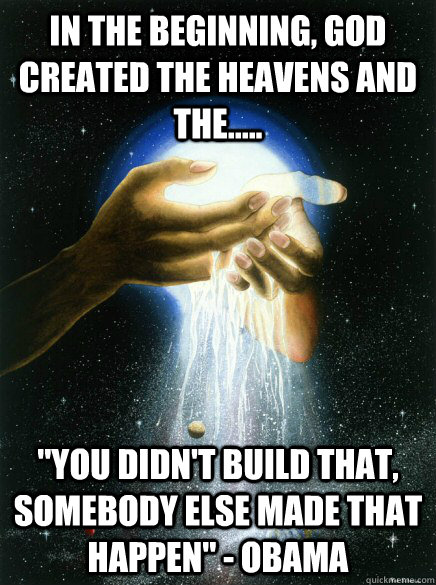Do you still think thats right? Do you owe people 50% of your work in perpetuity because of roads that were already paid for (partially) by your taxes, and the taxes of your family before? Do you owe cronies and lazy people money because other people helped invest in roads in the past?
It's a ridiculous statement either way (and I interpreted it as you did).
If I'm paying 50% of what I earn, obviously I've been rather successful. To what, then, do I owe my success? Is it solely the result of my own hard work? My own conscious choice? If it's that simple, why isn't everyone as successful as I? Why don't they just make the same choice I've made?
The answer is, it's not. Not that simple, and not solely the result of my own choice.
So much of what determines our success in life happens before we are even born, let alone everything that comes after. If I had been born in a slum in Bangalore, what are the odds that I'd have even 1/10th the opportunity to earn enough to put me into a 50% effective tax rate bracket?
Your place of birth, how well your parents raised you, how attractive, intelligent, and healthy you are, your primary education, how society treats you - all of that plays an enormous role in your success in life.
You could be attractive, smart, talented, healthy, with perfect parents, but be born in a slum, and your opportunities would be greatly diminished. Or you could be all of the above and be born in a wealthy country, but have a crippling disability. Or be a marginalized ethnic minority. Any little thing could've gone against you and radically changed the odds of your success.
That's not to say hard work and perseverence don't play a role. Of course they do, unless you were literally born rich, or got incredibly lucky.
But even the ability to exercise willpower and perserverence is largely determined by genetics and formative environment.
Children who are able to delay gratification do better later in life.
Eldest siblings are more ambitious and successful, on average.
Yet you earned none of that. Given that all those things play such a large role, how can you claim the rewards of your success as yours and yours alone?
"So? Life ain't fair."
No, no it's not. And if you're one of life's winners, lucky for you. I'd think you a selfish ass for saying it though.
One of the great benefits of people banding together in a society is that we can reduce that inherent unfairness - something I think we're all better off for in the long run.
Now speaking of roads and bridges, that's only a small part of it - but an easy one for people to understand. Government's investment in physical infrastructure has enormous long term benefits in terms of facilitating trade and strengthening the economy. And the early investment in the development of the internet has proved to be the interstate highway system of the 21st century.
But government also plays a role in investing in social infrastructure - laws and institutions that support trade and improve people's lives. A government that invests in its people - in terms of education and healthcare - will see long term benefits as a better educated and healthier population will have less crime, a lower birthrate, and higher earning potential.
We all end up paying one way or another. Less investment in social infrastructure means more crime = more police and more prisons. It also means lower productivity. Healthcare is expensive in part because of all the people who can't pay ending up in the emergency room for treatment.
Goverment's role in investing in both physical and social infrastructure has benefits for everyone. Better health and education translates into higher buying power = more customers for your business (or your boss's business).
That's the ideal, at least. The way it's gone down in America has been a mixed bag. Yup - cronyism and corruption are a problem. I think some other countries have a done a better job balancing the social good and economic freedom. I think a big part of the problem is cutural. Americans put affluence and success on a pedestal, coveting and consuming and competing, all too often to the detriment of health, happiness, community, the environment - the social good. Individuals relegated to cogs in the machine rather than respected as people. In Kantian terms, treating people as means rather than ends.
I'm not an idealist, or partisan zealot. I try to be pragmatic. I'm interested in what works. I'm interested in evidence. Striking a balance between individual liberty and the common good is always going to be a challenge. I can look around the world and see countries where things seem to be working better for average people than they are in the US. What are they doing differently? Could the US implement some of those ideas? Is that sustainable? I don't know. Is the US sustainable? I don't know. Is an anarchist, libertarian, propertarian society sustainable? I don't know. Which direction do we want to go? What's pragmatically achievable? Those are the questions I ask myself. The best I can do is be honest with myself and try to do what's right.


